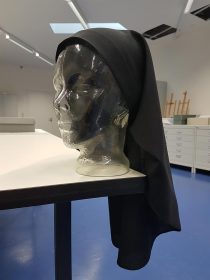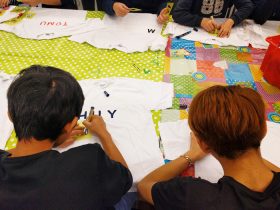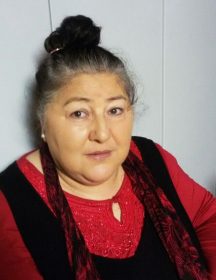A Visit with Sister Katharina at Karmel Berlin

Sister Katharina donated this veil to us for our exhibition; Jewish Museum Berlin, photo: Katharina Erbe.
Covering one’s head has almost entirely disappeared from Christian women’s devotional practice. In Germany, you only actually see veils on the sisters of Catholic religious orders. In preparing for the exhibition Cherchez la femme (more about it on our website) we all agreed early on that we wanted a nun’s veil.
So I set out for Karmel Regina Martyrum in the northern part of Berlin’s Charlottenburg district, a convent of Discalced (or Barefoot) Carmelites. The convent’s wardrobe mistress, Sister Katharina, greeted me at the door. After some discussion, her view on the matter emerged as fairly sober: some people may ascribe specific spiritual meaning to certain items of clothing but it was very personal issue. In any one community you can meet with a wide variety of attitudes and practices.
Our conversation about the meaning of their religious dress began with Sister Katharina sharing an anecdote: → continue reading
Workshops for young refugees

Whether in Hebrew, Arabic, or German, there are lots of ways to write one’s name; photo: private
What’s written in a Jewish marriage contract? As a minority, how do you secure your civil rights? And why is Hanukkah celebrated for eight days? My work as a guide at the Jewish Museum isabout how to coax stories from objects on display — but also about language. The first thing I did when I began working here about four years ago was to look up how to say “ruminants with cloven hooves” in French. You need to have this phrase at the ready if you want to explain Jewish dietary laws to a group of French museum visitors. My French didn’t help much, however, when I led the first workshops in August of 2016 for Welcome Classes. → continue reading
Reading with Anita Awosusi

Anita Awosusi has championed Sinti and Roma civil rights; photo: private
Our series “New German histories” continues this year: on February 9, 2017, (the date was cancelled at short notice!) Anita Awosusi will introduce her book Vater Unser – Eine Sintifamilie erzählt (Our Father – A Sinti Family Recounts) in the W. Michael Blumenthal Academy of the Jewish Museum Berlin. In her book the author weaves together her family’s biography, broader historical events, and the aftermath of Nazi rule. She tells the story of her father and at once of her own evolution. As a civil rights activist she still fights today against discrimination and for equal rights and civic participation for the Sinti and Roma peoples and was active for over twenty years at the documentation and cultural center for German Sinti and Roma. In anticipation of the event we asked Anita Awosusi three questions:
You entitled your book Our Father – A Sinti Family Recounts. Is the play on the central Christian prayer, the “Our Father”, intentional on your part? If so, what did you want to express with this choice?
The title Our Father came about because my sister and I always say “our father” when we talk about our parents. In addition, my father had a very fundamental role in our family as patriarch. Not to suggest at all that our mother was less respected by us children. But there was a second reason: → continue reading


